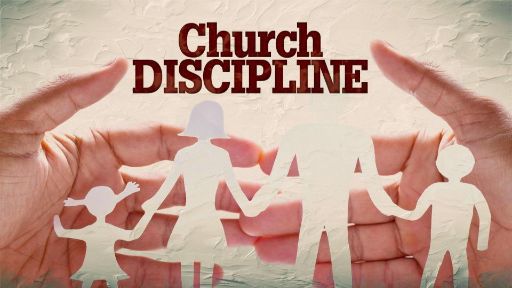-
Responsibility And Accountability In Church Discipline
Contributed by Douglas Phillips on Nov 28, 2017 (message contributor)
Summary: This is the second of a three part series on Church Discipline. It looks at the role of each of the characters presented in Matthew 18:15-18, and the role each has in bringing a fallen brother or sister back to the Lord.
The Loving Act of Church Discipline Part 2:
Accountability and Responsibility
INTRODUCTION:
As I begin this sermon this morning I am reminded of a story about a person who didn’t want to go to Church. He told his mother this and she told him that he had to go. "But mom, they don’t like me there." His mother said, "There are a lot of people who like you, now you have to go." "But mom, it’s too hot in the church." His mother replied "We’ll sit by a window, now we have to go." "But mom, I’m too tired, I watched the late show last night." His mother replied "It’s only for an hour and after that I’ll let you sleep all afternoon." "But mom,..." and this time his mother wouldn’t let him finish. "Son you have to go," she said. "You’re the minister!"
In our lives there are a lot of things we don’t like to do. Yet we have to do them because we are the only ones uniquely qualified to do that particular task. The same is true with Church Discipline. No one likes going through the process. We are dealing with friends and in some cases even relatives who have fallen, and yet the Scriptures state that we as Christians are the only ones who can use this extreme measure in an attempt to restore a brother or sister back to their relationship with the Lord.
It’s also true that very few people like to be told they are accountable and will be held responsible for anything in society today. We can accept it in the workplace because there is renumeration for the job that we do. But outside the workplace, we have a difficult time when someone tells us that we have to accept additional accountability and responsibility, especially when because of a stand we take, we have no alternative.
Yet this is exactly the position that as a Christian we find ourselves in. As a Christian our lives are not our own anymore (2 Cor. 5:14-15; Gal. 2:20). These passages tell us that as Christians our lives are no longer ours to live as we chose. We live our lives according to the Word of God and that Word includes accepting the responsibility and accountability to administer Church Discipline should it be needed.
In our past study on Church Discipline, we determined that it was a positive action when exercised according to the Bible’s guidelines. I mentioned that of the six cases where discipline should have been used, of the five cases that exercised discipline in some form, four of the individuals were restored. In the one case where it was not used, it led to the resignation of the pastor and left the church ripe for a split. It’s only when sin is dealt with in a Biblical manner that positive results can follow (Hebrews 12:15).
Thus the question must be asked, if we have no alternative should the situation arise but to use Church Discipline, what is our responsibility and accountability in the process? That is what I want to deal with today. If we look closely at the Matthew passage, four different groups of people are established, therefore I would suggest to you today that burdens of accountability and responsibility fall on :
1. The individual Christian in the Church (Verse 15)
2. The fallen brother or sister (Verses 15-18)
3. The witnesses (Verse 16)
4. The Church congregation. (Verse 17)
We will also see that ultimately as a Church we will stand accountable and responsible to God for our actions in attempting to restore a fallen brother or sister
POINT ONE: THE INDIVIDUAL CHRISTIAN IN THE CHURCH.
Jesus addresses the individual concerning Church Discipline in verse 15. It tells us that if a brother sins against you, it is your responsibility to go to the brother or sister and attempt to make it right. But this is also the tip of the ice berg. There is much to look at before we get to this stage. We must also realize that as a member of a congregation, we also have the responsibility to make sure that the process is done in a just and biblical manner, with restoration the ultimate goal.
Our individual responsibility covers several areas:
1. We must consider our own walk with the Lord. We need to make sure that our Christian walk measures up to Biblical standards. Now, no one can do this perfectly, we will always have sin in our lives that we need to confess, repent of, and make right. This is what Jesus is refering to in Matthew 7:1-6. Jesus is instructing us first to make sure that our lives are in order, to remove the plank in our own eye, before we attempt to remove the speck in our brothers. We need to measure our hearts by Paul’s words in Philippians 4:5-9.

 Sermon Central
Sermon Central



